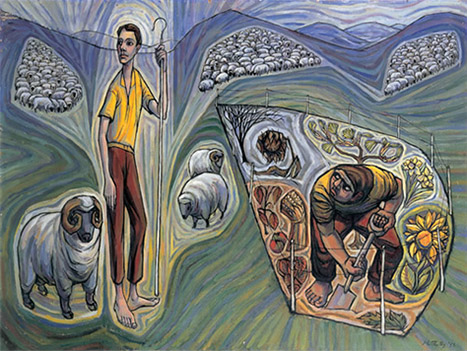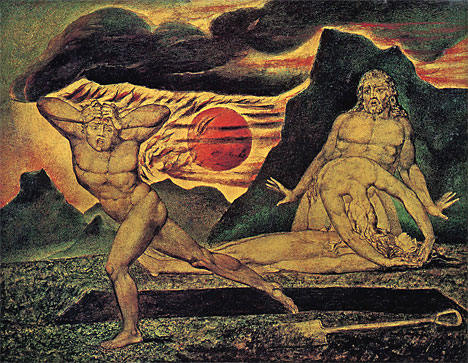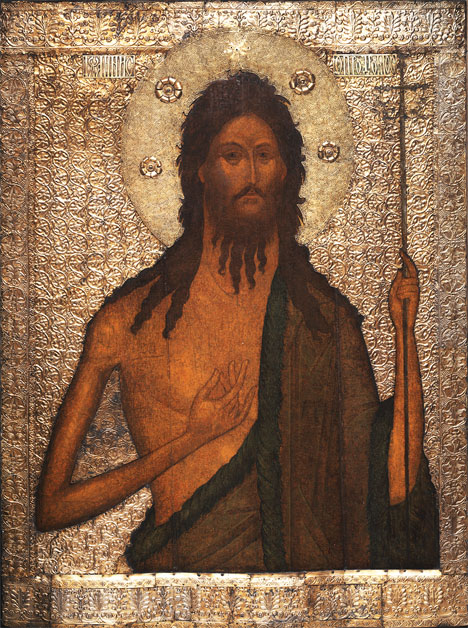Jul
25
2014

In a Land from which Cainites were being dispossessed, Israel herself would not only judge between the manslayer and the avenger of blood, but provide cities of refuge to the “firstborn” Levites as a gift.
The Avenger of Blood
Like Adam, Cain would not “bear” his sin. But unlike Adam, Cain was rejecting the covering of animal substitutes. As the “offspring” of the serpent (kinghood without priesthood), he only understood law as tyranny. There was no place for mercy (Atonement) because mercy required Covenant confession.
Continue reading
Comments Off | tags: Abel, Cain, Genesis, High Priest, Levites, Numbers | posted in Biblical Theology
Jul
2
2014
Raising Cain

“Just as Circumcision made impossible a global corruption,
so paedobaptism makes impossible a global Gospel.”
Part 1 here.
With so many young people leaving the Church, it is no wonder that there is a push to renew an understanding of biblical Covenant. Giving our children a profound sense of their “Covenant identity” is a crucial means of re-establishing the Covenant framework which has been neglected. Unfortunately, those pushing for these things are going about it in entirely the wrong way, because they are re-establishing the wrong Covenant.
Continue reading
12 comments | tags: Abel, Abraham, Babel, Baptism, Cain, Circumcision, Covenant Theology, Genesis, Jonah | posted in Biblical Theology
Jan
16
2014
or Baptism into Baal

Then you shall say to Pharaoh,
‘Thus says the Lord,
Israel is my firstborn son,
and I say to you,
“Let my son go that he may serve me.”
If you refuse to let him go,
behold,
I will kill your firstborn son.’”
(Exodus 4:22)
My Federal Vision friends believe baptism is an important subject, from both theological and pastoral points of view. I agree, but for me it is also an issue of aesthetics. The Bible has a wonderfully consistent internal logic, and paedobaptism crunches the gears at every turn.
Peter Leithart just posted something concerning baptism, and it’s worth answering, not only “because somebody on the internet is wrong,” but also because it is an issue I’ve just finished dealing with in The Shape of Galatians. It should be noted that Trinity House is hosting some lectures on sacraments by a baptist, so Dr Leithart and his colleagues have a spirit that should be imitated by theologians everywhere. My own posts here are always bait in the hope of a bite, a friendly disputatio, so don’t take them the wrong way. If a friend has soup on his tie, or wax in his ear, or a fertility rite in his sacrament, what sort of friend isn’t going to point it out!?
Continue reading
4 comments | tags: Abel, Abraham, Baptism, Cain, Federal Vision, Galatians, Genesis, Numbers, Paul, Peter Leithart, Romans, The Shape of Galatians | posted in Bible Matrix, Biblical Theology, Quotes
Dec
20
2013

God loves His architecture. The first chapter of the Bible is architecture. The books of Moses and the book of Revelation are filled with architecture, and the same floorplan underlies every book in between. Most Christians don’t understand the Bible’s architecture and modern Christians not only do not understand it, they do not care for it. But God loves His architecture. To love the Bible one must love its architecture. To understand the Bible, one must let the architecture inform one’s understanding.
Continue reading
Comments Off | tags: Abel, Baptism, Cain, Circumcision, Covenant curse, Covenant Theology, Genesis, High Priest, Numbers, Peter Leithart | posted in Biblical Theology, Quotes
Mar
16
2012
 Douglas Wilson writes:
Douglas Wilson writes:
“What is the meaning of ”one is taken and the other left’? This is commonly thought to refer to the rapture — one taken up into heaven, and the other left on earth to kick himself for not praying the sinner’s prayer when he had a chance. On the bright side, there will be a lot of free, unmanned cars available” (Heaven Misplaced, p. 104).
Matthew 24 is a prediction of the Covenant curses falling upon Judah for the last time. One being taken and the other left has to do with displacement. Titus enslaved the best Jews and took them in ships to Egypt.
“And the Lord will take you back to Egypt in ships, by the way of which I said to you, ‘You shall never see it again.’ And there you shall be offered for sale to your enemies as male and female slaves, but no one will buy you.” (Deuteronomy 28:68)
It’s one thing to get the historical fulfilment correct, but there’s a whole lot more going on here. In His speech, as the fulfilment of Israel, Jesus is working through the Bible Matrix, a combination of the Creation week, the weekly and annual Feasts, and the process of Dominion. This means that He is using examples of all the previous historical Covenant structures to make His point. The Covenant cycle has snowballed through history and picked up a lot of events on its way.
Continue reading
1 comment | tags: Abel, Atonement, Cain, Covenant Theology, Deuteronomy, Doug Wilson, Esau, Feasts, Genesis, Jacob, Lamech, Literary Structure, Matthew, Systematic typology | posted in Against Hyperpreterism, Bible Matrix, Biblical Theology, The Last Days
Feb
29
2012

Howbeit that was not first which is spiritual, but that which is natural; and afterward that which is spiritual. The first man is of the earth, earthy: the second man is the Lord from heaven. As is the earthy, such are they also that are earthy: and as is the heavenly, such are they also that are heavenly. And as we have borne the image of the earthy, we shall also bear the image of the heavenly. (1 Corinthians 15:46-49)
We’ve been talking about “intuition,” which is something ascribed more to women than to men. If we relate it to hermeneutics, does this mean women make better Bible interpreters, or is there something deeper going on?
Continue reading
2 comments | tags: Abel, Cain, Covenant curse, Covenant Theology, Eric Greene, Genesis, Hermeneutics, James Jordan, Liturgy, Paul, Resurrection, Revelation, Systematic typology | posted in Biblical Theology, Quotes
Feb
8
2012
Atonement and Enthronement

“Jesus does what no medicine man
or witch doctor is able to do.”
And they came to Jesus and saw the demon-possessed man,
the one who had had the legion, sitting there,
clothed and in his right mind, and they were afraid. – Mark 5:15
Rich Bledsoe’s old blog is a goldmine. Here’s an excerpt from The Dysfunctional Family of the Gadarene Madman.
Continue reading
Comments Off | tags: Abel, AD70, Atonement, Cain, Circumcision, Edwin Friedman, Feasts, Genesis, James Jordan, Job, Matthew, Rene Girard, Revelation, Rich Bledsoe | posted in Biblical Theology, Quotes, The Last Days
Dec
11
2011
“So David (Sabbath – Creation)
Continue reading
Comments Off | tags: Abel, Atonement, Cain, David, Feasts, Genesis, High Priest, Samuel | posted in Bible Matrix
Oct
29
2010
The Slow Wheels of Justice

I am Habakkuk the prophet. And this is the message that the LORD gave me. Our LORD, how long must I beg for your help before you listen? How long before you save us from all this violence? Why do you make me watch such terrible injustice? Why do you allow violence, lawlessness, crime, and cruelty to spread everywhere? Laws cannot be enforced; justice is always the loser; criminals crowd out honest people and twist the laws around.
Habakkuk 1:1-4
[Part 1 here.]
Perhaps there is more to this idea of “suing God” than a mere Puritan quote, especially when God Himself fails to keep His own rules, when God Himself appears to break Covenant.
Continue reading
Comments Off | tags: Abel, AD70, Covenant curse, Covenant Theology, David, Habakkuk, Judges, Peter Leithart, Postmillennialism, Revelation, Samson | posted in Biblical Theology, Quotes, The Last Days
Oct
27
2010

or The Ultimate Rip Off
“So Satan answered the LORD and said, ‘Skin for skin!
Yes, all that a man has he will give for his life.’” Job 2:4
NOTE: THIS POST HAS BEEN REMIXED AND INCLUDED IN GOD’S KITCHEN.
Part of allowing the Bible to interpret the world for us is to see the significance of things. Modern evangelicals generally pass off the weird references to things like bone, flesh and skin as though they were part of an outmoded worldview. But modern scholars are themselves still made of bone, flesh and skin. These things are significant in the created order. They communicate something to us. Bone is structure, flesh is life, and skin is glory. It is a three-level Tabernacle: Garden, Land, World, or Word, Sacrament, Government. [1]
There was some discussion recently on the BH forum about the “skin” that the Lord used to make “tunics” for Adam and Eve. The Hebrew word is singular, so James Jordan thinks it was a single animal, a single mediator picturing Christ. He is probably right, but I recently said that I thought it was likely a bull was killed for Adam and a goat or two for Eve, prefiguring the Day of Covering (Atonement). It would then have been the Lord as the Single Mediator, the High Priest making two approaches: one to cover the head, and another to cover the body. This means there would have been blood shed twice. Can this be linked to the death of Christ? Yes, it can, and in a way that few Bible expositors see because they won’t recognise repeated patterns. Continue reading
2 comments | tags: Abel, Genesis, Job, Revelation, Totus Christus | posted in Biblical Theology


































